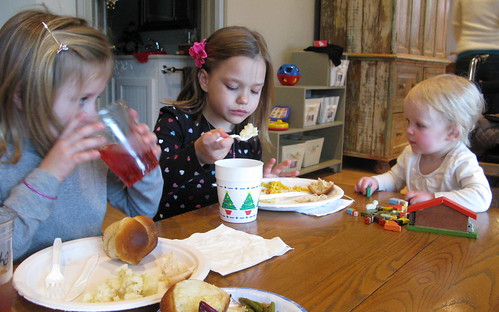This past Shabbat my synagogue had a guest speaker. He spoke in the morning during services, led a discussion afterwards and had a final session in the evening, when we gathered for S’lichot, the penitential prayers we say the week before Rosh HaShanah, the Jewish New Year.
Michael Soberman, Director of National Initiatives for the Next Generation at UIA Federations Canada, was talking about the future of the Jewish community in Canada and elsewhere. He was very funny and articulate, and had many shocking, entertaining and interesting things to say. One of the most enlightening, to me, was the statement: “I like working for the Jewish community because, at age 45, I’m considered young.” He talked about how younger people, not students but young professionals in their late twenties and early thirties, are not taken seriously or allowed into the inner circles of power in the community. As he put it, they are made to sit at the kids’ table and discuss “youth issues”, but not participate in any kind of real decision-making. I have no doubt that other ethnic and religious communities are no different – the baby boomers have the power firmly in their hands and have no intention of sharing it anytime soon.
In the interests of full disclosure, I must tell you that I am technically a baby boomer myself, having been born in 1962, right at the tail end of that massive generation. I am just about old enough, at age 49, to be inducted into the corridors of power at the institutions where I work and volunteer. The large majority of the leaders are in their fifties and sixties, everywhere we look in our society. Their priorities are the priorities of all of society, just as they have been all their lives. Schools were built for them, then universities, then the economy expanded to give them all jobs. Now they are beginning to retire, and the contraction of the life stations they have left behind continues. The expansion of the future is going to be in geriatrics, retirement homes and health care. Not that the latter is not important to younger people, but it appears to be of particular fascination to the older generation, and it seems to have taken a position front and centre in this election’s discourse. More doctors, more nurses, more access to hospitals and new technology. More hips and knees and diabetes clinics.
This past Friday a televised leaders’ debate was held here in Manitoba. I was very taken with the performance of James Beddome, leader of the provincial Green Party. While he is unlikely to be elected this time around (although in Wolseley, Winnipeg’s granola belt, all things are possible), it is wonderful to see a 27-year-old banging on the doors of power, demanding to be let in. In a society that is focused on the needs of the aging, the young will have to speak loudly and clearly to be heard. The boomers have never had to consider anyone’s needs besides their own, which is why Gen X has had such a terrible time of it in their shadow. If the Millennials want a place at the adult table, they are going to have to push very, very hard. It would be wise of us to welcome them. As the old adage says, be nice to your kids, they will choose your nursing home.
What do you think?
Note: a shorter form of this blog will appear tomorrow on CBC Manitoba’s website.


Maybe a difference is that in Canada the employer doesn’t have to pay for the employee’s health insurance, at least not directly (of course they are paying through their taxes, but it isn’t more if their employee has health problems).
If you want to see a great example of an older politician mentoring the younger generation, you should Google Jack Layton and the NDP Quebec caucus. Quite enlightening. I believe the youngest MP in that caucus is 19 years old.
And yes, the younger generation has always banged on the doors of power ;-). How old are the top people at HP and other big corporations in the US? Not 27, unless they started FB or Google.
I’m not saying to throw the baby boomers out, heaven forfend. We still have a lot to offer and a lot of life ahead of us. But many institutions are reluctant to share power with younger people, and that’s bad.
It’s interesting, because I perceive it a bit differently. Here, the elderly are too often seen as a drain on resources, overpriced when it comes to hiring decisions, and I get the sense that a large number of people would prefer that they just stopped living.
I think the key to all this is appreciation of what different perspectives, experiences, and knowledge each generation can bring to the table – and to make the table bigger. Here, in my home, the “kids’ table” is usually the most sought after by all, IF it exists at all. I’ve always had a seat at the adult table, and have always enjoyed my kids eating, traveling, and doing things with us.
I don’t think it’s good to bang at the doors of power – but neither is it wise for the elders to refuse to share it, as someone has to mentor the young. Respect on both sides of that door would be a very good thing, don’t you think?